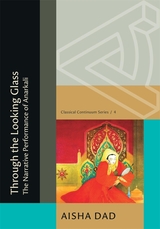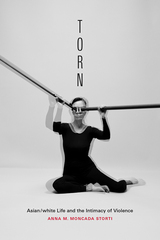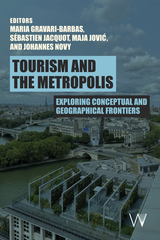5 books about Criminal procedure
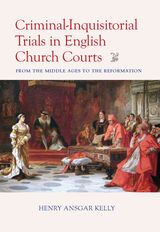
Criminal-Inquisitorial Trials in English Church Trials
From the Middle Ages to the Reformation
Henry Ansgar Kelly
Catholic University of America Press, 2023
After inquisitorial procedure was introduced at the Fourth Lateran Council in Rome in 1215 (the same year as England’s first Magna Carta), virtually all court trials initiated by bishops and their subordinates were inquisitions. That meant that accusers were no longer needed. Rather, the judges themselves leveled charges against persons when they were publicly suspected of specific offenses—like fornication, or witchcraft, or simony. Secret crimes were off limits, including sins of thought (like holding a heretical belief). Defendants were allowed full defenses if they denied charges. These canonical rules were systematically violated by heresy inquisitors in France and elsewhere, especially by forcing self-incrimination. But in England, due process was generally honored and the rights of defendants preserved, though with notable exceptions.
In this book, Henry Ansgar Kelly, a noted forensic historian, describes the reception and application of inquisition in England from the thirteenth century onwards and analyzes all levels of trial proceedings, both minor and major, from accusations of sexual offenses and cheating on tithes to matters of religious dissent. He covers the trials of the Knights Templar early in the fourteenth century and the prosecutions of followers of John Wyclif at the end of the century. He details how the alleged crimes of “criminous clerics” were handled, and demonstrates that the judicial actions concerning Henry VIII’s marriages were inquisitions in which the king himself and his queens were defendants. Trials of Alice Kyteler, Margery Kempe, Eleanor Cobham, and Anne Askew are explained, as are the unjust trials condemning Bishop Reginald Pecock of error and heresy (1457-59) and Richard Hunne for defending English Bibles (1514). He deals with the trials of Lutheran dissidents at the time of Thomas More’s chancellorship, and trials of bishops under Edward VI and Queen Mary, including those against Stephen Gardiner and Thomas Cranmer. Under Queen Elizabeth, Kelly shows, there was a return to the letter of papal canon law (which was not true of the papal curia). In his conclusion he responds to the strictures of Sir John Baker against inquisitorial procedure, and argues that it compares favorably to the common-law trial by jury.
[more]
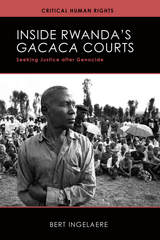
Inside Rwanda's /Gacaca/ Courts
Seeking Justice after Genocide
Bert Ingelaere
University of Wisconsin Press, 2018
After the 1994 genocide in Rwanda, victims, perpetrators, and the country as a whole struggled to deal with the legacy of the mass violence. The government responded by creating a new version of a traditional grassroots justice system called gacaca. Bert Ingelaere, based on his observation of two thousand gacaca trials, offers a comprehensive assessment of what these courts set out to do, how they worked, what they achieved, what they did not achieve, and how they affected Rwandan society.
Weaving together vivid firsthand recollections, interviews, and trial testimony with systematic analysis, Ingelaere documents how the gacaca shifted over time from confession to accusation, from restoration to retribution. He precisely articulates the importance of popular conceptions of what is true and just. Marked by methodological sophistication, extraordinary evidence, and deep knowledge of Rwanda, this is an authoritative, nuanced, and bittersweet account of one of the most important experiments in transitional justice after mass violence.
Weaving together vivid firsthand recollections, interviews, and trial testimony with systematic analysis, Ingelaere documents how the gacaca shifted over time from confession to accusation, from restoration to retribution. He precisely articulates the importance of popular conceptions of what is true and just. Marked by methodological sophistication, extraordinary evidence, and deep knowledge of Rwanda, this is an authoritative, nuanced, and bittersweet account of one of the most important experiments in transitional justice after mass violence.
[more]
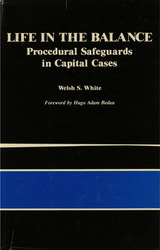
Life in the Balance
Procedural Safeguards in Capital Cases
Welsh S. White. Foreword by Hugo Adam Bedau
University of Michigan Press, 1984
Life in the Balance is a critical examination of our system of capital punishment. Individual essays carefully scrutinize legal rules that are of particular significance when a defendant’s life is at stake. One essay discusses the admissibility of confessions obtained by police trickery; another, the admissibility of government psychiatric testimony; and still another, the constitutional problems raised by the practice of death-qualifying juries in capital cases. In addition, the introduction places these issues in a proper context by explaining how the Supreme Court has erected a particular system of capital punishment, and delineating the legal issues that are likely to be especially significant in the future. Particularly directed to law professors and lawstudents, the book should be of interest as well to lawyers and judges who are involved in litigating issues related to capital punishment; and it should appeal to readers who are interested either in the death penalty or in the way in which the legal system seeks to provide procedural safeguards for those accused of serious offenses.
[more]
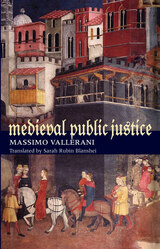
Medieval Public Justice
Massimo Vallerani
Catholic University of America Press, 2012
In a series of essays based on surviving documents of actual court practices from Perugia and Bologna, as well as laws, statutes, and theoretical works from the 12th and 13th centuries, Massimo Vallerani offers important historical insights into the establishment of a trial-based public justice system.
[more]

Prosecuting Crime in the Renaissance
England, Germany, France
John H. Langbein
Harvard University Press, 1974
READERS
Browse our collection.
PUBLISHERS
See BiblioVault's publisher services.
STUDENT SERVICES
Files for college accessibility offices.
UChicago Accessibility Resources
home | accessibility | search | about | contact us
BiblioVault ® 2001 - 2026
The University of Chicago Press


